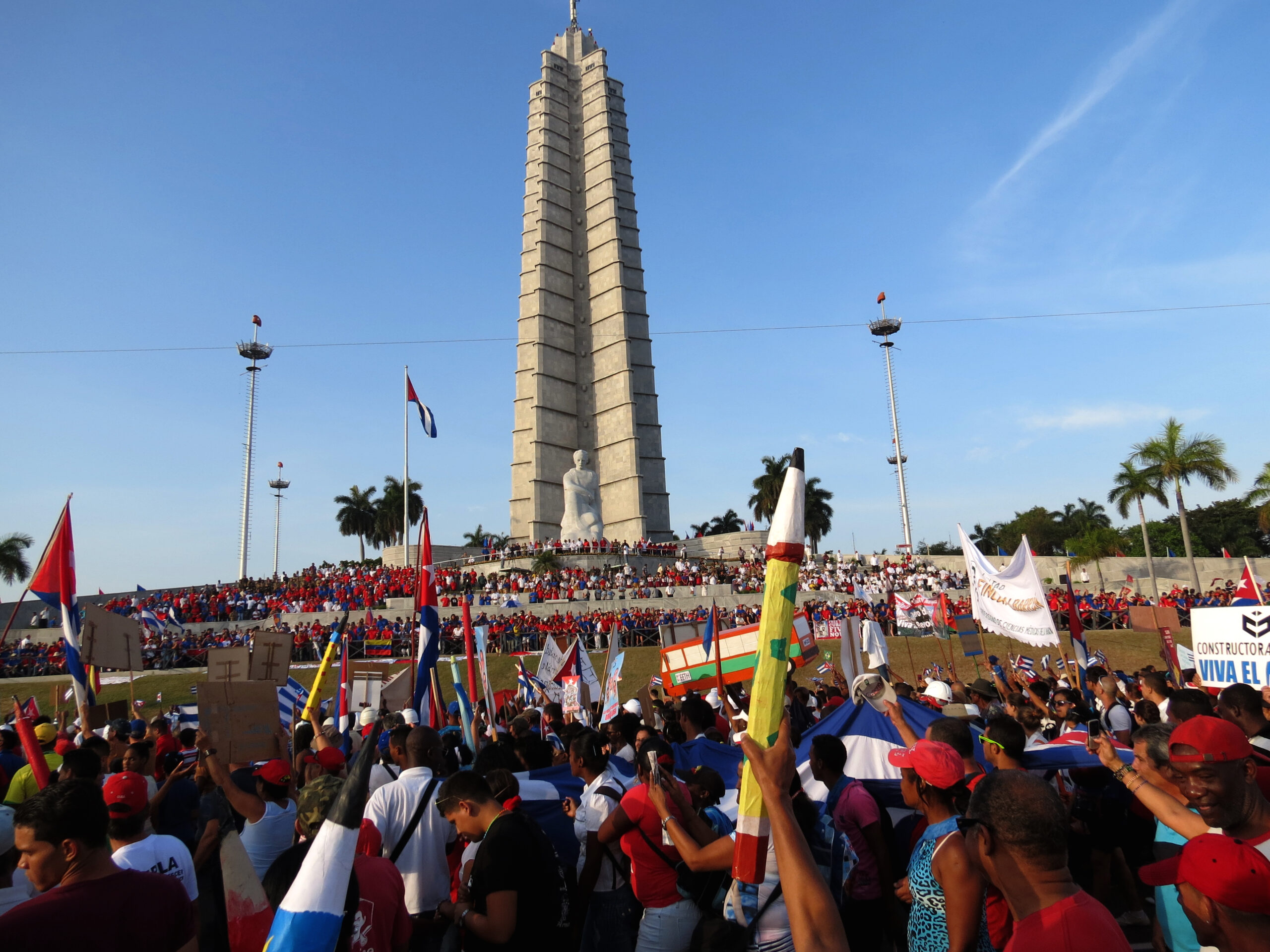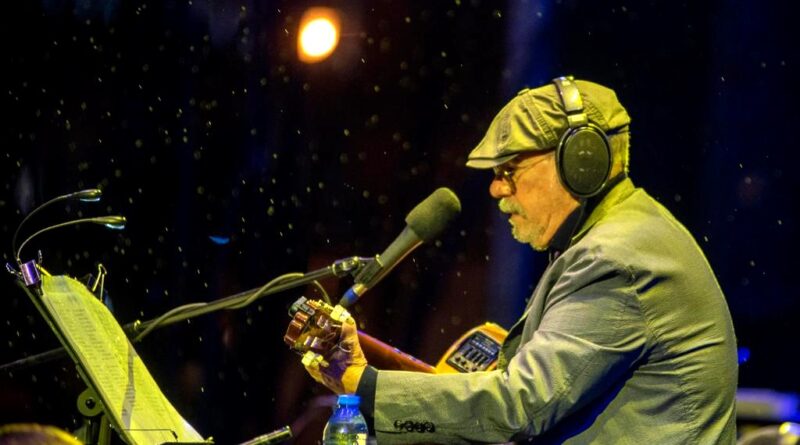Interview with Mythical Cuban Troubadour, Silvio Rodríguez: “I am closing ranks with my people who have been subjected to systematic torture for six decades”
By Arturo López Levy
Oakland, California.
I don’t remember when I started listening to Silvio Rodríguez’ songs. It must have been during college prep, once I was grown up and wanted to be able to express things better so that the ones that I loved would be more receptive to what I had to say. Since then, I have followed Silvio as a friend that he never knew he had. Sometimes I agreed with him, sometimes I disagreed, but I always admired his art and the way he used his own voice without echoing others. In the United States, at my universities, Silvio helped open doors for me with other Latin Americans who knew his songs.

When I met him in person in Washington, DC, as the Cuban embassy re-opened in 2015 after the reinstatement of diplomatic relations, he honored me with an embrace and a finger to my chest, saying that he had read my writing. Today I had the opportunity to interview him and discuss his talent without false equivalencies (to remind us of Jorge Mañach), but also without feigned formalities. For some inexplicable reason, the refrain “guajirito soy” kept running through my head. Following are the questions posed by an admirer and the responses of an artist and follower of Martí who was kind enough to answer them.
Silvio, you have sung about love in its most sublime and all-encompassing forms—love of a woman, nature, the family, one’s mother, wife, children, your town, San Antonio de los Baños, our heroes, Martí, Agramonte, and Cuba, the homeland. You have sung of love for Latin America, an identity, and humanity “homeland is humanity.” How do you mix all of those loves? Is it just a matter of feeling, or—in the style of your blog Segunda cita—as an intellectual public figure who rationalizes his passions?
I once heard Alfredo Guevara say that nations of people, out of their need for an identity, start by taking an inventory of themselves: their geography, their flora and fauna, the physical and spiritual characteristics of their people, etc. Over the years I came to realize that even more happens to those of us with a vocation to sing, because we begin by describing what surrounds us—both objectively and subjectively. Both reactions are a self-recognition of what makes consciousness: a sort of totemic act that consists of naming things. We all know that the world exists, because we see it, we feel it. But some of us need to sing about it so that reality can take on a life of its own and perhaps become complete.
Support this progressive voice and be a part of it. Donate to COHA today. Click here
Also, although like everyone else I was born with intellect, I have never seen myself as an intellectual. I have always had a sort of vocation to be a communicator. Segunda cita was an accident, one finding that led to others. Its highest form of expression was when it became a community, with all the complexities that involves. That, in a way, was its purpose, because during the first months I did not put any limits on it and there were all kinds of comments, some of them vulgar and offensive. That led me to moderate the blog, although internally I regretted some of the openness that was lost. Then I began to insist on candor combined with respect for others. And little by little, that spirit impregnated the space. Obviously, I was the first one who had to learn. It may be that I’ve tried to rationalize some passion (that is human), although I also try to explain why.
What does it mean to love Cuba in the 21st century, the supposed time of globalization and internationalization? How important is it for your children, grandchildren, and those who may follow to know that “In Tampa your grandfather spoke with Martí,” the Apostle of Cuban independence?
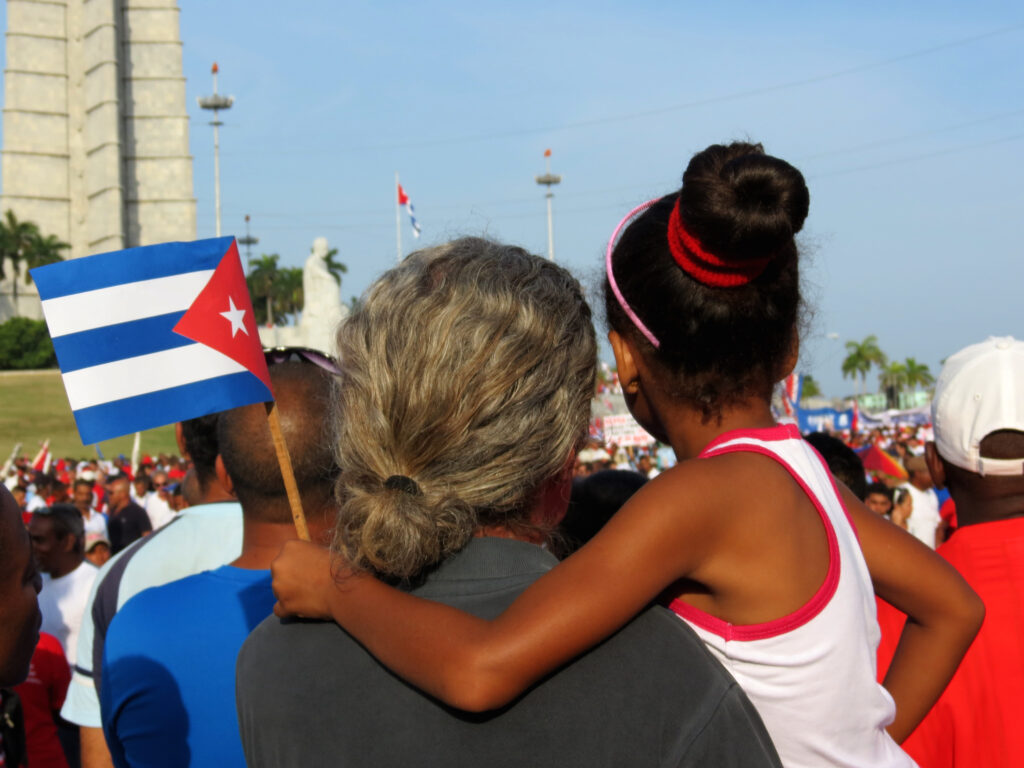
I have that privilege because my grandfather Félix’s father, Pancho Domínquez, was one of the Cuban cigar rollers who worked in the harvest in Tampa every year at the end of the 19th century, a time when a million cigars were manufactured in that Floridian city every year.
My grandfather never told me why he was in Tampa; I learned many years later from Dr. Beatriz Marcheco and her DNA studies. My grandfather only told me that while he was at a warehouse in Tampa as a child, a gentleman had asked him why he was in the country, and he answered that his father worked in a certain cigar factory. The gentleman smiled and told him that this was a coincidence, because a few days later he was going to visit his dad’s workplace to speak to the workers.
My grandfather always ended the story by saying, “And that kind man was José Martí.”
It is true that the times, periods of history, can color our loves and perceptions of things. This is much more so today, given the quantity and quality of so much content. But in addition to the overwhelming variety that technology offers us, the fact is that no one can be born today and say that their grandfather met Martí in Tampa. Surely that is why I sang about it, slightly envious of my Grandpa Félix.
You once said that you did not see Cuba “as an altar or a cathedral that one goes to.” Does being Cuban imply some responsibility? Do we Cubans have some defect that you feel you share? What do you think of the position in Cuba establishing an equivalency between being a patriot and being a revolutionary?
I have never understood such sanctification. It may be because of my way of seeing what is essential, in addition to the blindness implied in the concept of “sacred,” something untouchable. Everything that is respected, even that which is venerated, is so for more or less profound reasons which certainly can be explained.
Obviously, there is diversity in being Cuban, and I imagine this is more or less the same for any nationality. The intensity, I believe, depends on each person’s background. There are lives and circumstances that obviously determine one’s supreme adherence to oneself, to oneself above all else. There are others who do not so much feel that way, or who relegate this to another plane because they see themselves as part of a collective whole, as if the common fate were real life. The latter is something like a honeybee with a hive mentality. As for myself, I feel good when I see myself as part of a whole—a people and their history. In this I find an explanation that partially helps to explain the great mystery of life. I believe that this greatly helped my family with its modest mark on our national history. It also helps that when I was ten years old I read Emilio Roig’s Introduction (published 1953) to “La Edad de Oro” by Martí called “Martí y los niños. Martí niño.” (Marti and the children. Marti, the child.)
Finally, I believe there can be patriotic sentiments that do not agree with aspects of the Revolution or the Cuban government. But I do not believe that those who ask for blockades or interventions against their own country can be patriots.
Several academics have written that New Latin American song, of which Nueva Trova was an essential part, was an important source of an alternative culture—not only alternative to oligarchic power and right-wing military dictatorships, but also to a more traditional left. What did it mean for you to be part of that movement? What did you experience when singing in those countries after the openings at the end of the 1980s, as a result of pacts and political compromises?
Fortunately, from a very young age I liked to read history, literature, and scientific texts. Having participated in the Literacy Campaign** helped me understand that the country was expanding intellectually. This awareness helped me a few years later when I began to write songs. I prepared my first themes during my years of military service, without having debated anyone about such a job. That is why it was so gratifying when I left the army and began to discover young people who had done the same as I. Little by little, we created an esprit de corps, a sense of ourselves as a generation, which the press also began to perceive and to write about.
Casa de las Américas contributed greatly to our consolidation and the continuation of our generation of troubadours. Not only did it allow us a space in which to perform our songs, but we also furthered our knowledge of Latin America. For example, the first time I heard a Violeta Parra record was in Haydeé Santamaria’s house. Thanks to that connection, we were able to share with intellectuals such as Mario Benedetti, Roque Dalton, Julio Cortázar, and many others, without mentioning the privilege of listening to conversations with Lezama or José Zacaría Tallet, whom I even visited.

Later, Alfredo Guevara invited us to found the Grupo de Experimentación Sonora (Musical Experimentation Group) and work for the Cuban Cinematography Institute. By this time, Pino Solanas included my song “La Era Está Pariendo un Corazón” in his documentary “La Hora de los Hornos.” One day Isabel Parra visited me and we began to sing together. Daniel Viglieti arrived and recorded his record “Trópicos” with our group. We provided accompaniment for Soledad Bravo on the song “Santiago de Chile,” for a documentary by Juan Carlos Tabío. And at the Cuban Cinematography Institute we did a two-week-long identity concert which we called Cuba-Brazil.
In September of 1972 Noel Nicola, Pablo Milanés, and I were invited by Gladys Marín to the IV Congress of Young Communists of Chile. There we sang every night at the club belonging to the Parra family, along with the most well-known singers and bands, including, of course, Víctor Jara. That was a tremendous experience, not only professionally, but also in terms of commitment. The coup occurred one year later and we experienced a very tense moment in that revolution, which was painful in many ways because the left was criticizing Allende as much as the right. We were also tested personally, because more than once we were surprised by street demonstrations that were disbursed with clubs and tear gas.
In 1974 Noel and I were invited to 7 Días con el Pueblo, a new song festival put on by a trade union in the Dominican Republic. There we met Mercedes Sosa, whom we had seen in Havana, and we met Catalonian Francesc Pi de la Sierra and Spaniards Ana Belén and Víctor Manuel. The brothers and sisters who hosted us were Sonia Silvestre and Víctor Víctor, and we were fortunate to hear the very young Luís Díaz. Los Guaraguao of Venezuela were there. And the stadiums, that were always full, roared, “Joaquín Balaguer, a murderer in power!” while the police stood by powerlessly. When it all ended a colonel correctly told us we had 24 hours to leave the country.
Starting in 1975 we began to visit Mexico more than once a year. We participated in almost all the events organized by Uruguayan exiles. The first to play was always Alfredo Zitarrosa, and the band Sanampay was always there, comprised primarily of exiled Argentinians and some former members of Herque Mapu (Hebe Rosell and Naldo Labrín). That is where we were when Tania Libertad arrived from Peru. We were friends of the extraordinary Amparo Ochoa, Oscar Chávez, Marcial Alejandro, and Gabino Palomares. And we saw people come to interpret the transcendence of Eugenia León and Guadalupe Pineda.
I never managed to meet Violeta Parra personally, but I was able to approach Yupanqui in Berlin in February of 1985 when we both played at the Festival of Political Song sponsored by Free German Youth in what was still the GDR. I saw him in a concert he gave at a theater along with my friend Ángel Parra, who accompanied him on some pieces because arthritis kept Yupanqui from moving his fingers. Later we saw each other a few times in Buenos Aires and on one of those occasions Eduardo Aute accompanied me. A few months before his death, Don Ata honored me by attending one of my concerts at the Gran Rex, which I of course dedicated to him.
It is quite true that we did all of that very pleased to be part of anti-imperialist Latin America, with a very strong cultural and historical identity. I still carry that satisfaction with me. I can say that it is one of the experiences I am most grateful to have had.
You were just in Mexico where, for several nights, you filled the National Auditorium singing “El Necio” (the Fool), once dedicated “to Fidel, now to Andrés Manuel [López Obrador].” What did Fidel Castro, and the opportunity to speak to him, mean for your personal story as a Cuban? How do you view the New Left in the hemisphere, often called the pink tide, for whom AMLO of Mexico is a central figure?
In the late 1950s, the people were very much against the dictatorship. Imagine, the revolution triumphed one month after I turned 12. We learned about Fidel from Radio Rebelde, which we listened to very softly some nights. Fidel was a great symbol. For some reason, I never saw him as a god; I always understood him to be a special man, but a man just the same.
The first time I was close to him was in 1961, when he came to send off those of us working in the Literacy Campaign who were leaving from Varadero to the far reaches of Cuba the next day. I was directly below the podium; little by little I made my way up. I recall my astonishment upon seeing that his beard was reddish brown and not black, as it looked in photographs. There I heard everything he told us about the importance of our mission and for the first time, I felt like part of something big, something more than just myself.
I exchanged a few words with him in 1984 when Pablo and I returned from our first trip to Argentina, which received a lot of coverage in the Argentine press and other places. Casa de las Américas gave us a reception upon our return, and all of a sudden, he showed up. He stayed for a long time, engaging in a fraternal exchange with everyone. At the end, they took a few photos and the next day we were on the front page of Granma.
I learned from my friend Julio Le Riverend that in 1968 Fidel had asked what happened to me at the so-called “little Congress” prior to a Congress on Education and Culture that was held that year. Alfredo Guevara later corroborated that Fidel had said that taking an artist’s job away was not right (I had been kicked out of a cultural agency), and that if there was some kind of problem, it should be discussed.
Later I had other opportunities to talk to him, particularly towards the end of the 1980s when I prepared a plan to build better recording studios in Cuba. One day I was surprised to receive an invitation to a lunch Fidel was giving for Rafael Alberti. In the middle of the lunch Fidel asked me if I could stay a bit afterwards, and I said yes. It was to ask me about the studios I said I wanted to have built. That was the beginning of all that was done afterwards.
“El necio,” to some degree, is a song about Fidel. He is a man who at times seems to act illogically, whose arm could not be twisted, whose moral clarity could confront any adversity. I say “to some degree” because El necio also includes a lot about my own journey and how I see certain things. And in what many people see as strength and determination, I describe as someone who simply accepts his destiny, the factors from within and without that converged to write one’s story. I believe that I express this quite clearly when I say,
I do not know what destiny is,
As I went along, I was what I was.
God over there, may be divine,
I will die as I lived.
One topic that is quite present in your blog Segunda cita is the economic, trade, and financial blockade that successive U.S. governments have maintained against the Cuban people. I admire your clear position that it is a fundamental cause of the problems in Cuba. This matters, because today the regime change strategy imposed from outside, which is upheld by some supposedly moderate sectors, is to minimize its relevance and advocate for alleged flexibility on issues of sovereignty. How important do you think AMLO is—who has a flexible relationship and even integration with the United States—to the issue of Latin American dignity when he demands total opposition to the blockade with no concessions?
There are many interpretations around the blockade and why Cuba has so many problems. There are the extremes: those who blame everything on the blockade, and then those who blame the Cuban government. But when those who maintain the blockade discover any measure the provides breathing room to Cuba, they say it is providing oxygen to the regime so they eliminate it. This leaves no doubt that they know Cuba would be better off without the blockade. It exposes the depth of malice in their intentions and the monstruous scope of their practice. Gabo [García Márquez] was right when he called the blockade against Cuba genocide.
I dedicated “El necio” to Andrés Manuel because he has dared to defend Cuba like few others. And because defending us is to defend the right of any nation to be as it wishes to be and to resolve its internal problems without interference or harassment from anyone. AMLO is a living example of the spirit of Juárez, who said that “respect for the rights of others is peace.” Bolívar, Martí can be found in him, as they were in Fidel.
And it would not surprise me if the ultra-left were to call Andrés Manuel pseudo left. The troubadours of my generation were called the same by extreme leftist Cubans when we defended the Revolution with rock rhythms, such as in “Cuba va.”
During the Obama years you gave memorable concerts all over the United States. I saw you live at the mythical Paramount Theatre in Oakland and later at Carnegie Hall in New York, that paragon of U.S culture, where you played to packed auditoriums. What was typical of your notable presence there were the Latinos and Cubans who sang along with your songs. What do you think of the proposition that the United States is now a Latin American country, too?
Pete Seeger attended the second concert we gave in Carnegie Hall. He had turned 90 a year earlier and I was not able to attend his tribute because my visa did not arrive on time. We had a very special exchange later on that night, which was the last time I saw him. He told me that he knew that Latin America and Cuba could not make progress because of the interventionist policy of his country’s government. He was very ashamed of this and visibly moved. I know that many other U.S. citizens feel this way, although one does not need to be so lucid to have feelings of equity and respect for one’s neighbor.
I do not doubt that the United States, to some degree, is also a Latin American country today. It is likely that some day this ingredient may come to have a positive influence on its policies. But it is obvious that many Latinx people that go there do so because there are not enough opportunities in our countries. That is why, the more opportunities we have at home, the less people need to migrate and the fewer tensions there are with the United States over migration. That was the approach Andrés Manuel had with Trump when he talked about building his border wall. I have more faith in that approach, at least for now, than any positive influence that may stem from having a large number of our people over there.
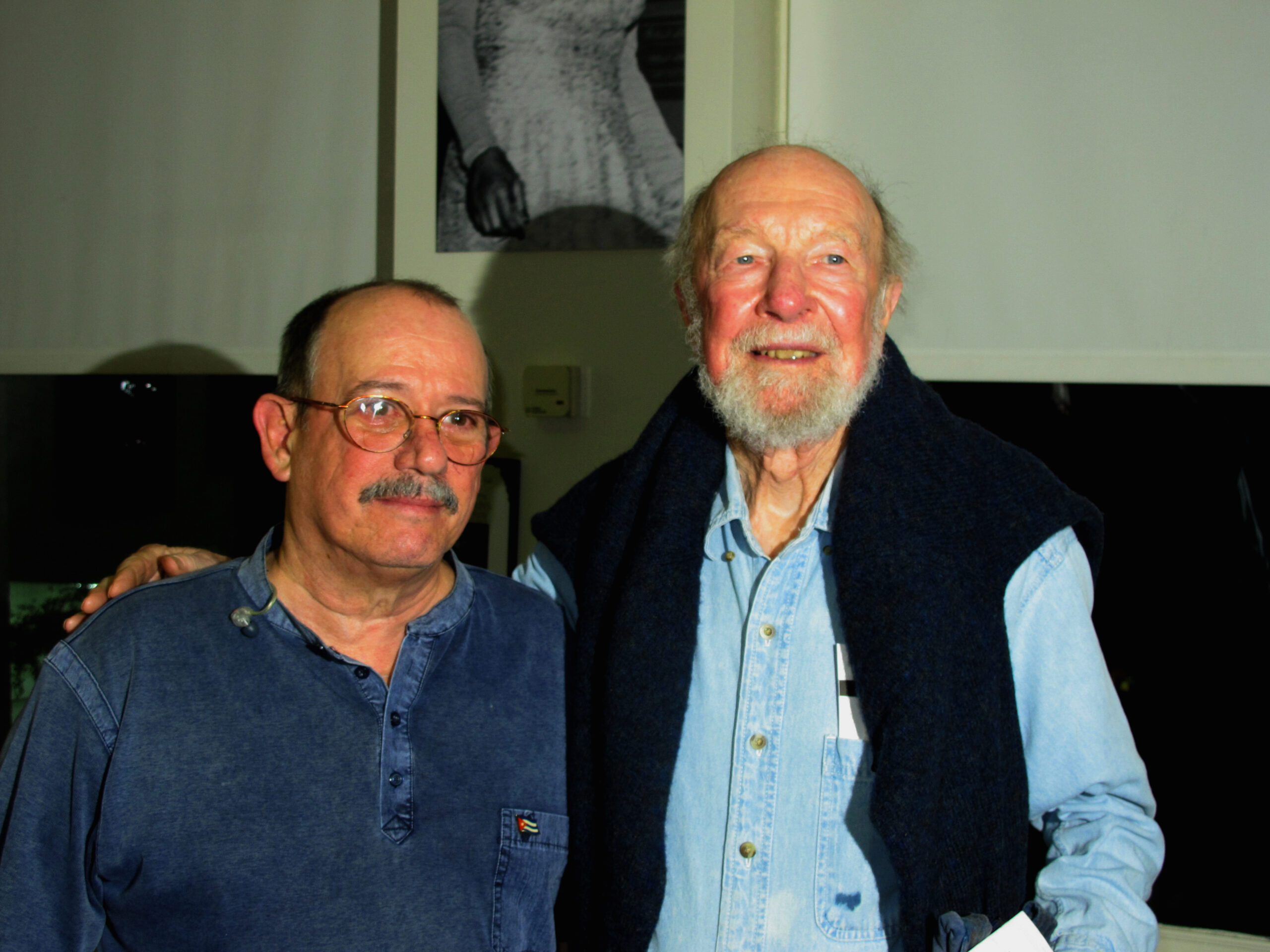
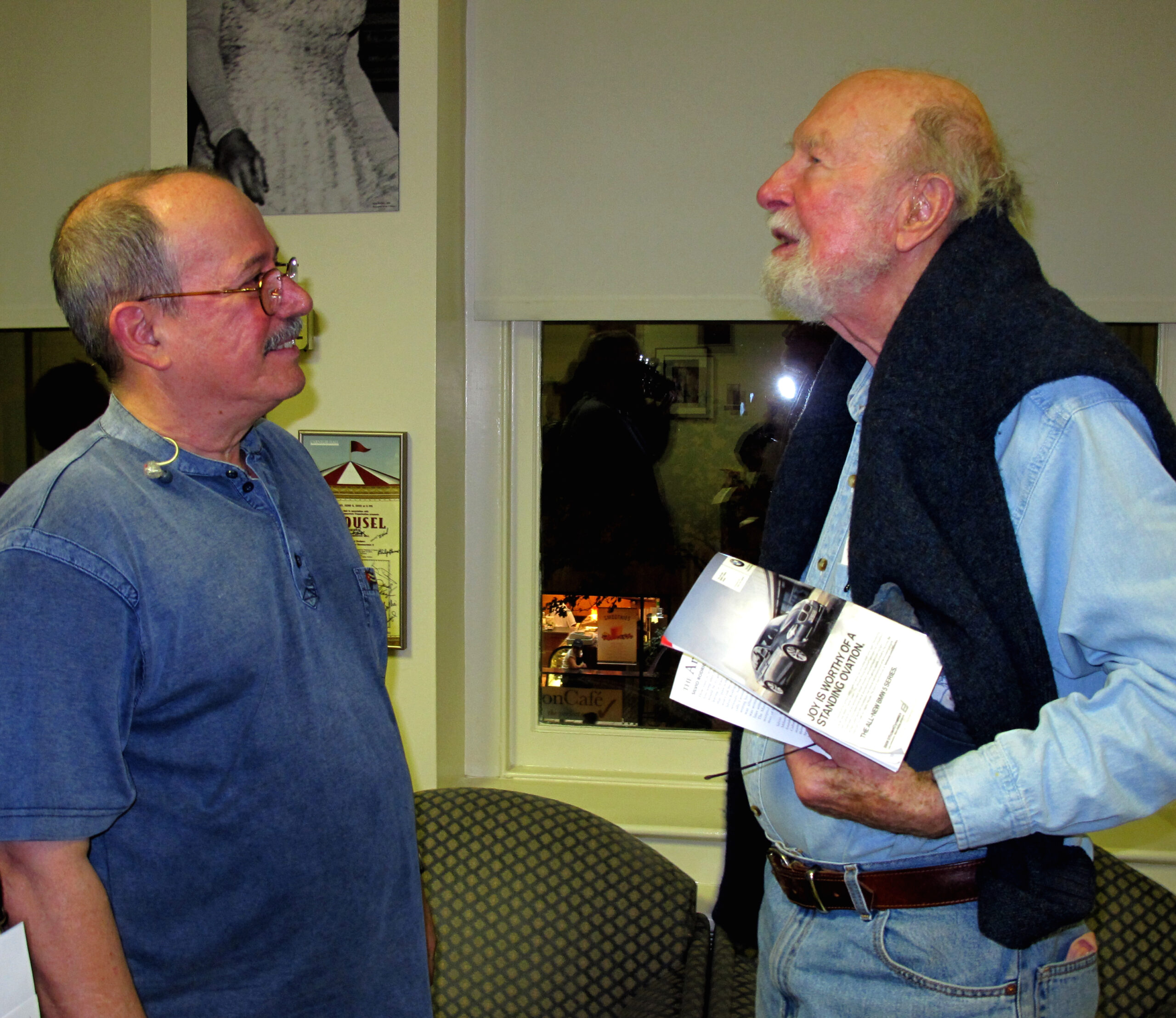
You were present during the ceremony when the Cuban Interest Section in Washington, DC turned into an embassy, where we met for the first time. What vision do you have about the role of patriotic emigration on the future of Cuba and its relationship with the United States? Would you give a concert in Miami some day?
I believe that the future of Cuba includes the responsibility to help of all those who love her. This happens in any family. Those who make a commitment, those who express solidarity, are those who respond to problems constructively. I am capable of respecting and working with those who do not think like me. I hope that this grows.
As for a concert in Miami, are there poor neighborhoods there? I would like to have a concert there, in a neighborhood
On at least one occasion, in 1986, Carlos Alberto Montaner tried to incite Pablo Milanés and you to change sides and place your artistic success at the service of the regime change strategy imposed from the outside. You answered, “No one pays us to defend what we believe in. Every day we do a rigorous but necessary examination of our own consciences, and if we disagree with something, just as when we agree, we sing and assume the task in Cuba and wherever necessary.” Has it been hard, this “need to live without a price,” at the same time that you conduct “a rigorous but necessary examination” of your conscience? Have you ever thought of alternatives?
Living in Cuba, materially speaking, can be tough for anyone, Arturo. Even for those who have enjoyed some success and have some money. If you live in Miami or Madrid, no one questions your good fortune.
Back in 1961 (when I was 14 years old) we began to experience shortages, particularly of medicines. We got momentary relief when members of Brigade 2506 [Cuban Exiles caught at the Bay of Pigs] were exchanged for supplies. But the material limitations the Cuban people have suffered, all kinds of inconveniences, shortages in daily life, would suffice to write a series a thousand times juicier than The Sopranos, or even the Bible; the crucified one would not be one man but a whole population.
As for the circulation of ideas, this has also been complicated. The ultra-defensive mentality brought on by so many acts of aggression and some formulaic interpretations of what a socialist society should be, creates conflict. There have been compulsive periods, times which mark the lives of many people and which bring us down.
The truth is that throughout time, in all countries and systems there have been good people and less good people. There are intelligent beings and non-intelligent ones everywhere. In all settings there are honest, altruistic people who are in solidarity with others; there are also mediocre, opportunistic and corrupt people. It never occurred to me to blame the Revolution for a bad time I may have experienced. Ever since I was young, I have realized that these are matters of human beings, circumstances. One day you get kicked, but the next day someone kisses you.
Starting with oneself, there is nothing perfect in this world, sometimes not even the ideas that seemed best at a previous time. Factors that raise questions always arise, sowing doubt, expanding our perspective. This occurs naturally, without outside intervention. But just imagine what is provoked by a project for the emancipation of a small country that is challenging the most powerful and vicious interests on the planet.
We were recently talking about such issues on Otra cita (https://otracitasc.blogspot.com), the blog that continues where mine, Segunda cita, left off. We came to the conclusion that thinking is very important, but what we do after we think is even more important.
In the US, without excluding Miami, there are Cuban emigrants who hold patriotic values. The right wing has tried to construct an identity that requires taking on their bitterness and hatred, but many, including those who were born there, feel a dual identity because they are from there but also from Cuba to multiple degrees. Being a North American does not invalidate their being Cuban, and vice-versa. I have cousins in Miami who left Cuba in the 1950s and 1960s who had to listen to your songs with their car windows closed during times of intolerance. Is that no longer necessary? How important is the cultural exchange between the United States and Cuba, as well as between Cubans in Cuba and those in the United States in terms of a rapprochement?
I do not have the slightest doubt, and I said this several times when there was distrust over Obama’s openness, that with this exchange Cuba’s interests would win out. What I am saying is that in the United States they have a distorted image of what Cuba is, even more distorted than what Cubans may think of the US. And I think that is why most of the US administrations do not allow their citizens to go to Cuba. They don’t like what might result from that exchange because the Americans could arrive and meet people who are fun, friendly, well-educated, and appealing. In addition to any economic benefits we might get from such an exchange, how could they continue to justify their policy of suffocating a population like that?
In “Llegué por San Antonio de los Baños” you sing of Martí’s vision that “homeland is humanity” that starts where we are born. One area in which we Cubans could cooperate despite our differences is by improving our towns and cities, countryside, rivers, dams, and beaches. For example, in China and Vietnam many emigres contribute a lot and even invest in and collaborate with their hometowns and the land of their ancestors. How important is what you call “the universal detail of my native region” to be “a little bit better and much less selfish?”
“… But the universal detail
of my native region
was a man
opening a trail on the clock.”
This means that everywhere we have something basic in common: we are born as human beings and the succession of generations gives us the opportunity to learn and improve.
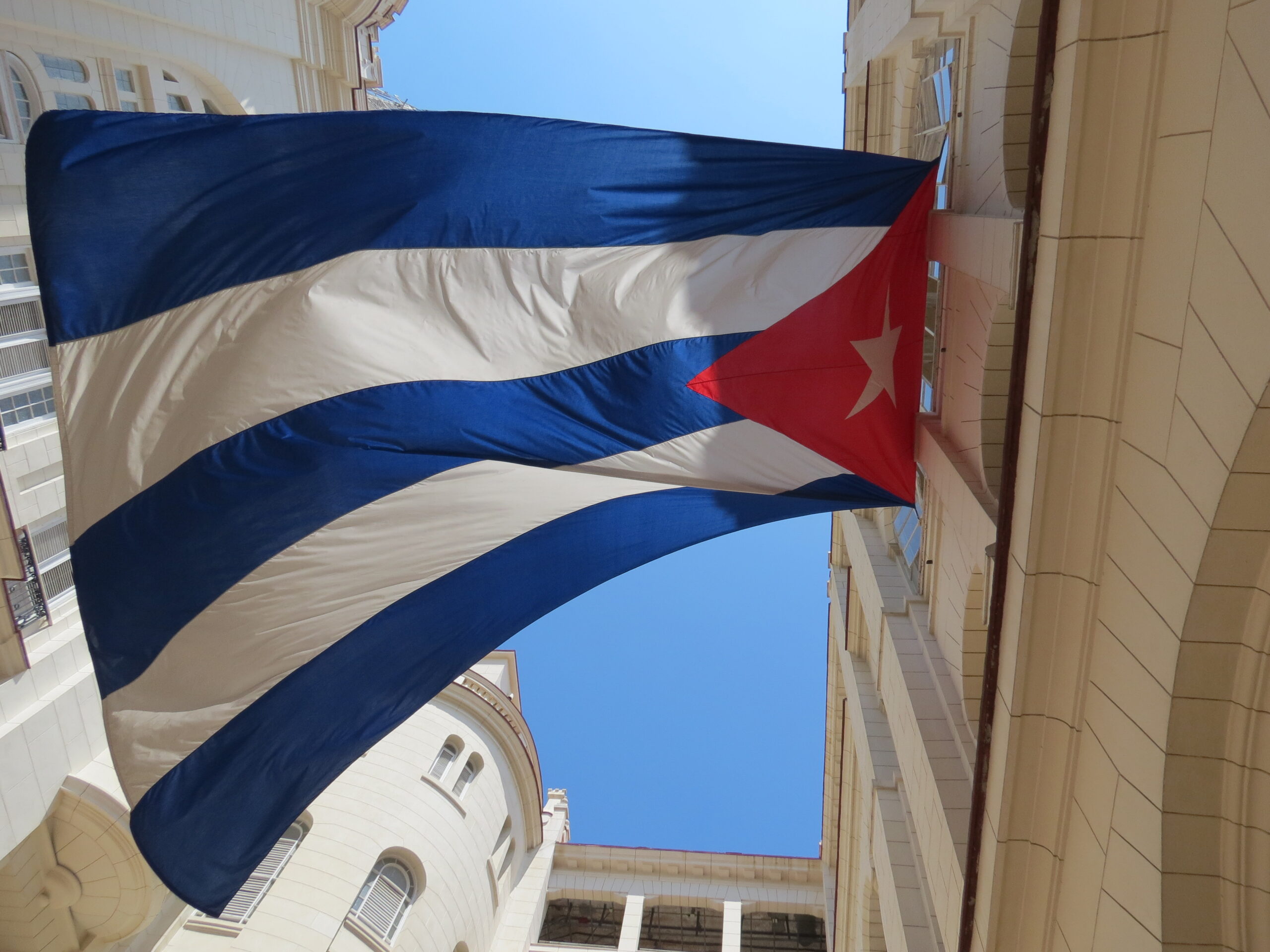
I have lived my 75 years in Cuba and can affirm responsibly that here we are more than ready to share with any nation, of course including with the United States of America.
It is impossible to compare us with China or Vietnam. No bank in the world will give a loan to Cuba because the United States, thanks to its extraterritorial laws, would impose millions of dollars in fines. There are very few shipping companies that dare to send ships with supplies to Cuba, because the US would then prohibit those ships from entering its ports. China is a very wealthy country with many natural resources. Vietnam is smaller but also rich. It endured plunder, indignities, and wars, but it is not currently blockaded and trades freely with the world, even the United States. We Cubans have been denied that for over 60 years, and when we have been allowed to trade, we are forced to pay in cash with suitcases full of dollars.
We distribute our doctors and vaccines around the world. Thousands of professionals from the third world have been educated at our universities. For decades Cuba has been showing that it is a civilized country, that it works on the basis of peaceful coexistence—we promoted and hosted the Colombian peace talks. However, Cuba has been stigmatized by an imperial government with a long history of abuse in many places.
I am quite aware that we need to be a little bit better (and sometimes more than a little bit) in some ways. But it is up to us to fix our shortcomings and it is inadmissible that we be blackmailed for that, as if we were a stain. For this reason, out of basic decency, I will first of all close ranks with my people who have been subjected to systematic torture for six decades. Some US leaders are lacking not a little bit, but a large dose of humanity. I hope that our descendants over there will understand this and decide to act accordingly.
Arturo López-Levy is a Senior Research Fellow at the Council on Hemispheric Affairs (COHA). He is a professor of international relations and politics at Holy Names University in Oakland, California, and author of “Raúl Castro and the New Cuba: A Close-up of Change.” Twitter, @turylevy.
This interview was translated from the original Spanish by Jill Clark-Gollub, COHA’s Assistant Editor/Translator.
